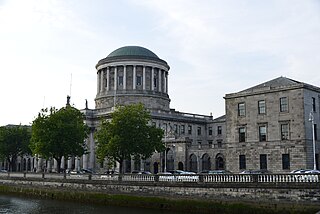Related Research Articles

The Constitution of Ireland is the fundamental law of Ireland. It asserts the national sovereignty of the Irish people. It guarantees certain fundamental rights, along with a popularly elected non-executive president, a bicameral parliament, a separation of powers and judicial review.

The Constitution of the Irish Free State was adopted by Act of Dáil Éireann sitting as a constituent assembly on 25 October 1922. In accordance with Article 83 of the Constitution, the Irish Free State Constitution Act 1922 of the British Parliament, which came into effect upon receiving the royal assent on 5 December 1922, provided that the Constitution would come into effect upon the issue of a Royal Proclamation, which was done on 6 December 1922. In 1937 the Constitution of the Irish Free State was replaced by the modern Constitution of Ireland following a referendum.

The Supreme Court of Ireland is the highest judicial authority in Ireland. It is a court of final appeal and exercises, in conjunction with the Court of Appeal and the High Court, judicial review over Acts of the Oireachtas. The Supreme Court also has appellate jurisdiction to ensure compliance with the Constitution of Ireland by governmental bodies and private citizens. It sits in the Four Courts in Dublin.
The First Amendment of the Constitution Act 1939 amended the Constitution of Ireland to extend the constitutional definition of "time of war" to include a period during which a war occurs without the state itself being a direct participant. It was introduced and signed into law on 2 September 1939, the day after the Invasion of Poland by Germany and allowed the government to exercise emergency powers during World War II although the state was neutral.
The Third Amendment of the Constitution Act 1972 is an amendment to the Constitution of Ireland that permitted the State to join the European Communities, which would later become the European Union, and provided that European Community law would take precedence over the constitution. It was approved by referendum on 10 May 1972, and signed into law by the President of Ireland Éamon de Valera on 8 June of the same year.
The Seventh Amendment of the Constitution Act 1979 is an amendment to the Constitution of Ireland that provides that the procedure for the election of six members of the Senate in the university constituencies could be altered by law. It was approved by referendum on 5 July 1979 and signed into law on 3 August of the same year.
The Ninth Amendment of the Constitution Act 1984 is an amendment to the Constitution of Ireland that allowed for the extension of the right to vote in elections to Dáil Éireann to non-Irish citizens. It was approved by referendum on 14 June 1984, the same day as the European Parliament election, and signed into law on 2 August of the same year.
The Tenth Amendment of the Constitution Act 1987 is an amendment to the Constitution of Ireland that permitted the state to ratify the Single European Act. It was approved by referendum on 26 May 1987 and signed into law on 22 June of the same year.
The Sixteenth Amendment of the Constitution Act 1996 is an amendment of the Constitution of Ireland which provides that a court can refuse bail to a suspect where it feared that while at liberty they would commit a serious criminal offence. It was approved by referendum on 28 November 1996 and signed into law on 12 December of the same year.
The Twenty-third Amendment of the Constitution Act 2001 of the Constitution of Ireland is an amendment that permitted the state to become a party to the International Criminal Court (ICC). It was approved by referendum on 7 June 2001 and signed into law on the 27 March 2002. The referendum was held on the same day as referendums on the prohibition of the death penalty, which was also approved, and on the ratification of the Nice Treaty, which was rejected.
Amendments to the Constitution of Ireland are only possible by way of referendum. A proposal to amend the Constitution of Ireland must be initiated as a bill in Dáil Éireann, be passed by both Houses of the Oireachtas (parliament), then submitted to a referendum, and finally signed into law by the president of Ireland. Since the constitution entered into force on 29 December 1937, there have been 32 amendments to the constitution.
An ordinary referendum in Ireland is a referendum on a bill other than a bill to amend the Constitution. The Constitution prescribes the process in Articles 27 and 47. Whereas a constitutional referendum is mandatory for a constitutional amendment bill, an ordinary referendum occurs only if the bill "contains a proposal of such national importance that the will of the people thereon ought to be ascertained". This is decided at the discretion of the President, after a petition by Oireachtas members including a majority of Senators. No such petition has ever been presented, and thus no ordinary referendum has ever been held.

The current Constitution of Ireland came into effect on 29 December 1937, repealing and replacing the Constitution of the Irish Free State, having been approved in a national plebiscite on 1 July 1937 with the support of 56.5% of voters in the then Irish Free State. The Constitution was closely associated with Éamon de Valera, the President of the Executive Council of the Irish Free State at the time of its approval.

The Third Amendment of the Constitution Bill 1958 was a proposal to amend the Constitution of Ireland to alter the electoral system from proportional representation under the single transferable vote (PR-STV) to first-past-the-post (FPTP). The proposal was rejected in a referendum held on 17 June 1959. This was the same date as the presidential election in which Taoiseach Éamon de Valera was elected as president.
Three referendums were held in Ireland on 25 November 1992, the same day as the 1992 general election. Each was on a proposed amendment of the Irish constitution relating to the law on abortion. They were enumerated as the Twelfth, Thirteenth and Fourteenth Amendments. The proposed Twelfth Amendment was rejected by voters while both the Thirteenth and Fourteenth were approved.
The Twenty-fourth Amendment of the Constitution Bill 2001 was a proposed amendment to the Constitution of Ireland to allow the state to ratify the Treaty of Nice of the European Union. The proposal was rejected in a referendum held in June 2001, sometimes referred to as the first Nice referendum. The referendum was held on the same day as referendums on the prohibition of the death penalty and on the ratification of the Rome Statute of the International Criminal Court, both of which were approved.
The Twenty-fifth Amendment of the Constitution Bill 2001 was a proposed amendment to the Constitution of Ireland to tighten the constitutional ban on abortion. It would have removed the threat of suicide as a grounds for legal abortion in the state, as well as introducing new penalties for anyone performing an abortion, by giving constitutional status to legislation proposed to be enacted after the amendment. It was narrowly rejected in a referendum held on 6 March 2002, with 50.4% against.

The Emergency Powers Act 1939 (EPA) was an Act of the Oireachtas enacted on 3 September 1939, after an official state of emergency had been declared on 2 September 1939 in response to the outbreak of World War II. The Act empowered the government to:
make provisions for securing the public safety and the preservation of the state in time of war and, in particular, to make provision for the maintenance of public order and for the provision and control of supplies and services essential to the life of the community, and to provide for divers and other matters connected with the matters aforesaid.

Seanad Éireann is the senate of the Oireachtas, which also comprises the President of Ireland and Dáil Éireann.
The Thirty-third Amendment of the Constitution Act 2013 is an amendment to the Constitution of Ireland which established a Court of Appeal to sit between the existing High and Supreme Courts for the purpose of taking over most of the appellate jurisdiction of the Supreme Court. The amendment was approved by the electorate in a referendum on 4 October 2013, and then signed into law by President Michael D. Higgins on 1 November 2013.
References
- 1 2 Hogan 2012 p. 697
- ↑ Hogan 2012 pp. 628–631
- ↑ Hogan 2012 pp. 697–698, 757
- ↑ Hogan 2012 p. 798
- 1 2 "Second Amendment of the Constitution Bill, 1940 [No. 40 of 1940]; Debates". Bills. Oireachtas. 27 November 1940. Retrieved 7 August 2024.
- ↑ Second Amendment of the Constitution Act 1941, Preamble
- ↑ Ó Cearúil 2003 p. 21
- ↑ Ó Cearúil 2003 pp. 23–24
- ↑ Ó Cearúil 2003 p. 3; Second Amendment of the Constitution Act 1941, Schedule Ref. Nos 1, 3, 5, 7, 8, 21, 26
- ↑ Ó Cearúil 2003 pp. 1, 9n18, 13–14, 17
- ↑ Ó Cearúil 2003 pp. 1, 15
- ↑ Ó Cearúil 2003 pp. 4, 39
- ↑ Ó Cearúil 2003 pp. 6–7
- ↑ Ó Cearúil 2003 p. 22
- ↑ Ó Cearúil 2003 p. 22n37